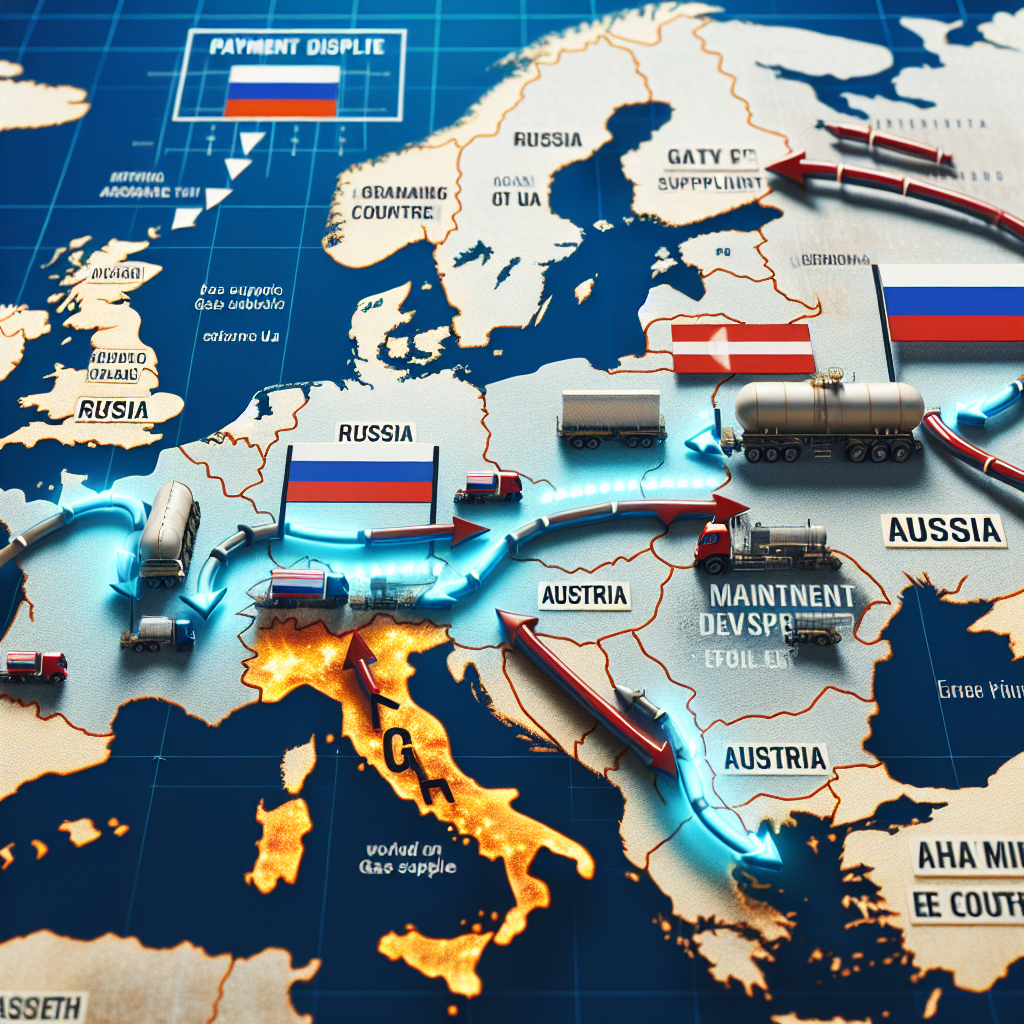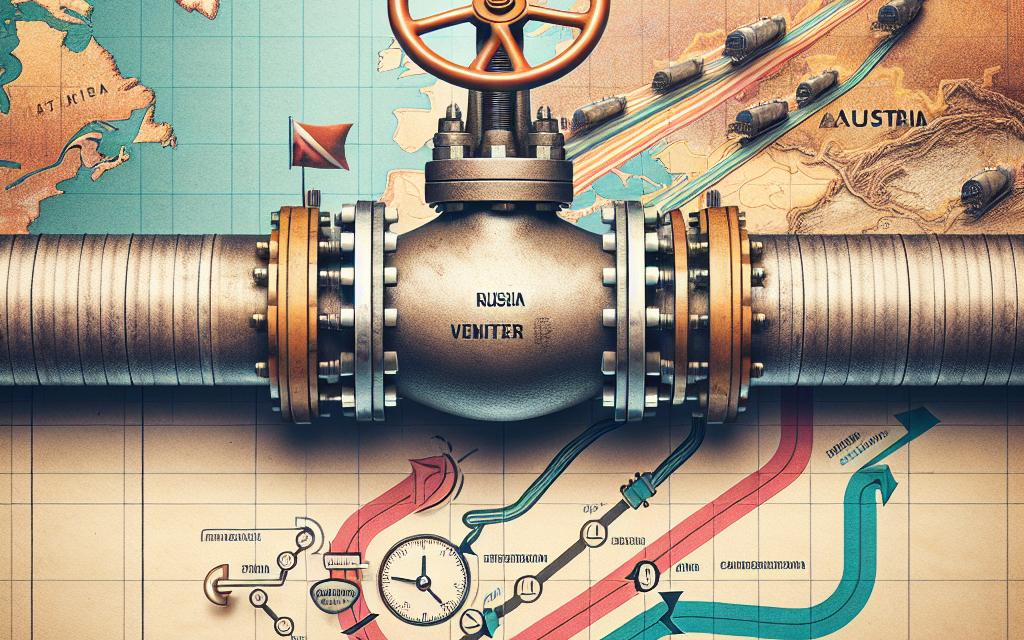“Austria Left in the Cold: Russia’s Gas Halt Amid Payment Clash, EU Supply Uninterrupted”
Introduction
In a recent development, Russia has ceased its natural gas supply to Austria due to a payment dispute, while continuing to maintain its deliveries to other European Union countries. This move underscores the complex dynamics of energy politics in Europe, where Russia remains a key supplier despite ongoing geopolitical tensions. The halt in gas supply to Austria highlights the vulnerabilities and dependencies within the European energy market, as nations navigate the challenges of securing energy resources amid fluctuating diplomatic relations. The situation raises concerns about energy security and the potential economic impact on Austria, while also prompting discussions on the broader implications for EU-Russia energy ties.
Impact Of Russia’s Gas Supply Halt On Austria’s Energy Security
The recent decision by Russia to halt its gas supply to Austria due to a payment dispute has raised significant concerns regarding Austria’s energy security. This development comes at a time when energy stability is crucial, especially as Europe approaches the colder months. While Russia has assured that its gas deliveries to the broader European Union will continue uninterrupted, the specific cessation of supply to Austria underscores the vulnerabilities inherent in the region’s energy dependencies.
Austria, like many European nations, relies heavily on Russian gas to meet its energy needs. This dependency has been a longstanding issue, with Russia being one of the primary suppliers of natural gas to Europe. The sudden halt in supply has forced Austria to confront the immediate challenge of securing alternative energy sources to ensure that its citizens and industries do not face shortages. In the short term, Austria may need to increase its reliance on stored reserves and seek additional imports from neighboring countries. However, these measures are not sustainable long-term solutions and highlight the need for Austria to diversify its energy sources.
The payment dispute that led to the halt in gas supply is a reminder of the complex geopolitical and economic relationships that underpin energy transactions. While the specifics of the dispute have not been fully disclosed, it is evident that such disagreements can have far-reaching implications. The situation serves as a catalyst for Austria to reassess its energy policies and consider investing in renewable energy sources, which could provide a more stable and sustainable energy future. Transitioning to renewables would not only enhance energy security but also align with global efforts to combat climate change.
Moreover, the halt in gas supply to Austria has broader implications for the European Union’s energy strategy. It highlights the need for a cohesive and coordinated approach to energy security across member states. The EU has been working towards reducing its dependency on Russian gas, but this incident underscores the urgency of these efforts. By investing in infrastructure that supports energy diversification, such as interconnectors and liquefied natural gas (LNG) terminals, the EU can mitigate the risks associated with over-reliance on a single supplier.
In addition to infrastructure investments, the EU must also focus on fostering energy solidarity among member states. This involves creating mechanisms for mutual support in times of energy crises, ensuring that no single country is left vulnerable to supply disruptions. The current situation with Austria serves as a reminder of the interconnectedness of European energy markets and the importance of collective resilience.
In conclusion, Russia’s decision to halt gas supplies to Austria over a payment dispute has significant implications for Austria’s energy security and the broader European energy landscape. While Austria grapples with the immediate challenges of securing alternative energy sources, the situation also presents an opportunity for the country and the EU to accelerate their transition towards more sustainable and diversified energy systems. By doing so, they can enhance their energy security, reduce dependency on external suppliers, and contribute to global efforts to address climate change. As Europe navigates this complex energy landscape, the importance of collaboration, innovation, and strategic planning cannot be overstated.
The Role Of Payment Disputes In International Energy Trade
In the complex landscape of international energy trade, payment disputes can significantly impact the flow of resources, as evidenced by Russia’s recent decision to halt gas supplies to Austria. This move, rooted in a financial disagreement, underscores the intricate dynamics that govern energy transactions between nations. While Russia has maintained its gas deliveries to other European Union countries, the cessation of supplies to Austria highlights the delicate balance that exists in international energy agreements and the potential repercussions of financial disagreements.
Payment disputes in the energy sector are not uncommon, given the substantial sums involved and the geopolitical implications of energy supply. These disputes can arise from various factors, including disagreements over pricing, currency fluctuations, and contractual terms. In the case of Russia and Austria, the specifics of the payment disagreement have not been fully disclosed, but it is clear that the issue was significant enough to prompt a suspension of gas supplies. This situation illustrates how financial disagreements can disrupt energy flows, even when broader geopolitical considerations might suggest a continued partnership.
The decision to halt gas supplies to Austria, while maintaining deliveries to other EU countries, reflects a strategic approach by Russia. By targeting a specific nation, Russia may be attempting to exert pressure on Austria to resolve the payment issue while minimizing broader disruptions to its relationships with other European countries. This selective approach allows Russia to maintain its role as a key energy supplier to Europe, a position that is economically beneficial and geopolitically strategic. It also serves as a reminder to other nations of the importance of adhering to agreed-upon financial terms in energy contracts.
Moreover, this incident highlights the interconnectedness of energy markets and the potential for localized disputes to have wider implications. While Austria is directly affected by the halt in gas supplies, other European countries are likely monitoring the situation closely. Any prolonged disruption could lead to shifts in energy prices and supply chains, affecting the broader European energy market. This interconnectedness underscores the importance of stable and predictable energy trade relationships, which are crucial for ensuring energy security and economic stability.
In addition to the immediate impact on Austria, this payment dispute may have longer-term implications for international energy trade. It could prompt countries to reassess their energy supply strategies, seeking to diversify their sources to reduce reliance on any single supplier. This diversification could involve increased investment in renewable energy sources or the development of alternative supply routes, such as liquefied natural gas (LNG) imports. Such strategic shifts could alter the landscape of international energy trade, influencing future negotiations and agreements.
In conclusion, the halt of gas supplies from Russia to Austria over a payment dispute serves as a poignant example of the role financial disagreements play in international energy trade. While Russia continues to supply other EU countries, the situation underscores the importance of clear and mutually agreed-upon financial terms in energy contracts. As nations navigate the complexities of energy trade, this incident may prompt a reevaluation of strategies to ensure energy security and stability in an increasingly interconnected world. The resolution of this dispute will be closely watched, as it may set precedents for how similar issues are handled in the future, shaping the dynamics of international energy relations.
How Austria Plans To Mitigate The Gas Supply Disruption
Austria is currently grappling with a significant challenge following Russia’s decision to halt gas supplies due to a payment dispute. This development has prompted the Austrian government to swiftly devise strategies to mitigate the potential impact on its energy security. As Austria heavily relies on Russian gas, the sudden disruption poses a risk to both its economy and the well-being of its citizens, especially as the colder months approach. However, Austria is not without options, and the government is actively exploring various measures to ensure a stable energy supply.
One of the primary strategies Austria is considering involves diversifying its energy sources. By reducing its dependency on Russian gas, Austria aims to enhance its energy resilience. This diversification effort includes increasing imports from other countries, such as Norway and Algeria, which have been identified as potential alternative suppliers. Additionally, Austria is exploring the possibility of increasing its reliance on liquefied natural gas (LNG) by expanding its LNG import capacity. This would allow Austria to tap into the global LNG market, thereby reducing its vulnerability to regional supply disruptions.
In tandem with diversifying its energy sources, Austria is also focusing on enhancing its domestic energy production capabilities. The government is investing in renewable energy projects, such as wind and solar power, to reduce its reliance on fossil fuels. By accelerating the transition to renewable energy, Austria not only aims to address the immediate supply disruption but also to align with its long-term sustainability goals. Furthermore, the government is encouraging energy efficiency measures across various sectors to reduce overall consumption, thereby easing the pressure on existing gas supplies.
To further bolster its energy security, Austria is strengthening its regional cooperation with neighboring countries. By collaborating with other European Union member states, Austria seeks to establish a more integrated and resilient energy network. This includes participating in joint infrastructure projects, such as cross-border gas pipelines and electricity interconnections, which would facilitate the sharing of resources during times of crisis. Additionally, Austria is actively engaging in discussions with the European Union to explore collective measures that could be implemented at the EU level to address similar supply disruptions in the future.
Moreover, Austria is taking steps to enhance its strategic gas reserves. By increasing the storage capacity and ensuring that reserves are adequately stocked, Austria aims to create a buffer that can be utilized in the event of prolonged supply disruptions. This approach not only provides a safety net but also instills confidence among consumers and businesses that the government is prepared to handle potential shortages.
In conclusion, while the halt in gas supplies from Russia presents a formidable challenge for Austria, the government is proactively implementing a multifaceted strategy to mitigate the impact. By diversifying energy sources, enhancing domestic production, strengthening regional cooperation, and bolstering strategic reserves, Austria is positioning itself to navigate the current disruption effectively. These efforts not only address the immediate crisis but also contribute to Austria’s long-term energy security and sustainability objectives. As the situation unfolds, Austria’s ability to adapt and innovate will be crucial in ensuring a stable and reliable energy supply for its citizens.
EU’s Energy Strategy Amidst Russia’s Selective Gas Deliveries

In recent developments, Russia has decided to halt its gas supply to Austria due to a payment dispute, a move that has raised concerns about the stability of energy supplies in Europe. Despite this disruption, Russia has assured that its gas deliveries to the rest of the European Union will continue uninterrupted. This selective approach to gas distribution underscores the complex dynamics of energy politics in the region and highlights the challenges the EU faces in ensuring a stable and secure energy supply.
The cessation of gas supplies to Austria comes at a critical time as Europe is grappling with energy security issues exacerbated by geopolitical tensions. Austria, heavily reliant on Russian gas, now finds itself in a precarious position, needing to explore alternative energy sources or negotiate terms to resume the supply. This situation serves as a stark reminder of the vulnerabilities associated with dependence on a single energy supplier, particularly one that has shown a willingness to leverage energy resources as a geopolitical tool.
Meanwhile, the European Union has been actively working on diversifying its energy sources to reduce reliance on Russian gas. This strategy includes increasing investments in renewable energy, enhancing energy efficiency, and seeking alternative suppliers. The EU’s commitment to the European Green Deal further emphasizes the importance of transitioning to sustainable energy sources, which not only addresses environmental concerns but also aims to bolster energy security.
In light of Russia’s selective gas deliveries, the EU’s energy strategy is being put to the test. The situation with Austria highlights the need for a coordinated and resilient approach to energy policy across member states. By fostering greater energy cooperation and integration, the EU can mitigate the risks associated with external energy dependencies. This includes developing infrastructure for liquefied natural gas (LNG) imports, expanding interconnections between national grids, and supporting cross-border energy projects.
Moreover, the current scenario underscores the importance of solidarity among EU member states. As Austria navigates this energy challenge, support from neighboring countries and the broader EU community will be crucial in ensuring that the impact on its economy and citizens is minimized. This spirit of cooperation is essential for maintaining the EU’s collective energy security and resilience against external pressures.
While Russia’s decision to maintain gas deliveries to other EU countries may provide some relief, it also serves as a reminder of the unpredictable nature of energy politics. The EU must remain vigilant and proactive in its efforts to secure a diverse and reliable energy supply. This includes not only addressing immediate challenges but also planning for long-term energy sustainability and independence.
In conclusion, the halt of gas supplies to Austria amidst a payment dispute with Russia highlights the intricate interplay between energy supply and geopolitical considerations. As the EU continues to navigate these complexities, its commitment to diversifying energy sources and enhancing cooperation among member states will be crucial in ensuring a stable and secure energy future. By prioritizing resilience and sustainability, the EU can better withstand the challenges posed by selective gas deliveries and other potential disruptions in the global energy landscape.
The Economic Implications Of Energy Supply Interruptions For Austria
The recent decision by Russia to halt gas supplies to Austria due to a payment dispute has sent ripples through the European energy market, raising concerns about the economic implications for Austria and the broader region. This development comes at a time when energy security is a critical issue for European countries, particularly as they strive to balance their energy needs with geopolitical considerations. While Russia has maintained its gas deliveries to other European Union countries, the interruption of supply to Austria underscores the vulnerabilities inherent in the continent’s energy infrastructure.
Austria, like many European nations, relies heavily on natural gas imports to meet its energy demands. The sudden cessation of Russian gas supplies poses significant challenges for the country, potentially leading to increased energy costs and disruptions in industrial production. As Austria scrambles to secure alternative sources of energy, the economic ramifications could be far-reaching. Higher energy prices may lead to increased production costs for businesses, which could, in turn, result in higher prices for consumers. This inflationary pressure could dampen economic growth and strain household budgets, particularly as the country is still recovering from the economic impacts of the COVID-19 pandemic.
Moreover, the halt in gas supplies could have a cascading effect on Austria’s energy strategy. The country may be compelled to accelerate its transition to renewable energy sources, a move that, while beneficial in the long term, requires significant investment and infrastructure development. In the short term, Austria may need to rely more heavily on coal or oil, which could have environmental implications and conflict with the European Union’s climate goals. This situation highlights the delicate balance that countries must maintain between ensuring energy security and adhering to environmental commitments.
In addition to the direct economic impacts on Austria, the interruption of gas supplies has broader implications for the European energy market. It serves as a stark reminder of the geopolitical risks associated with energy dependence on a single supplier. The European Union has long recognized the need to diversify its energy sources to enhance security and reduce vulnerability to external pressures. This incident may prompt EU member states to expedite efforts to develop a more resilient and diversified energy infrastructure, including investments in liquefied natural gas (LNG) terminals and interconnectors that facilitate energy sharing between countries.
Furthermore, the situation underscores the importance of diplomatic engagement in resolving energy disputes. While the payment disagreement between Russia and Austria is a bilateral issue, its resolution could set a precedent for how similar disputes are handled in the future. Diplomatic efforts to mediate and resolve such conflicts are crucial in maintaining stable energy supplies and preventing economic disruptions.
In conclusion, the halt of Russian gas supplies to Austria over a payment dispute has significant economic implications for the country and the broader European region. It highlights the vulnerabilities in the current energy infrastructure and underscores the need for diversification and investment in renewable energy sources. As Austria navigates this challenging situation, the importance of diplomatic engagement and regional cooperation in ensuring energy security cannot be overstated. The incident serves as a catalyst for re-evaluating energy strategies and underscores the critical role of energy policy in shaping economic stability and growth.
Russia’s Energy Diplomacy: Balancing EU Commitments And Bilateral Disputes
In a recent development that underscores the complexities of international energy diplomacy, Russia has halted its gas supply to Austria due to a payment dispute, while continuing to maintain its deliveries to the broader European Union. This decision highlights the intricate balance Russia must navigate between honoring its commitments to the EU and managing bilateral disputes with individual countries. The cessation of gas supplies to Austria comes at a critical time, as Europe braces for the winter months when energy demand typically surges. Austria, heavily reliant on Russian gas, now faces the challenge of securing alternative energy sources to meet its domestic needs. This situation not only puts pressure on Austria but also serves as a reminder to other EU nations of the vulnerabilities inherent in their energy dependencies.
Despite the halt in supplies to Austria, Russia has assured the European Union that it will continue to fulfill its contractual obligations to other member states. This assurance is crucial for the EU, which has been working to diversify its energy sources in recent years but still relies significantly on Russian gas. The EU’s energy strategy aims to reduce dependency on any single supplier, thereby enhancing energy security across the continent. However, the current dispute between Russia and Austria illustrates the ongoing challenges in achieving this goal. The EU’s reliance on Russian energy is a legacy of historical trade relationships and geographical proximity, making it a complex issue to address swiftly.
The payment dispute with Austria is not an isolated incident but rather part of a broader pattern of Russia’s energy diplomacy, where economic and political considerations often intersect. Russia’s energy exports are a vital component of its economy, and the country has historically used its energy resources as a tool for exerting influence on the global stage. In this context, the decision to halt supplies to Austria can be seen as a strategic move, potentially aimed at reinforcing Russia’s negotiating position. However, it also risks straining relations with the EU, which has been increasingly critical of Russia’s geopolitical maneuvers.
As the situation unfolds, it is essential for both Austria and the EU to engage in diplomatic efforts to resolve the dispute and ensure energy stability. The EU’s role in mediating such conflicts is crucial, as it seeks to maintain a unified stance on energy security while respecting the sovereignty of its member states. Additionally, this incident may serve as a catalyst for Austria and other EU countries to accelerate their efforts in diversifying energy sources, investing in renewable energy, and enhancing energy efficiency.
In conclusion, Russia’s decision to halt gas supplies to Austria over a payment dispute, while maintaining deliveries to the EU, highlights the delicate balance of its energy diplomacy. This situation underscores the importance of energy security and diversification for the EU, as it navigates the complexities of its relationship with Russia. As Europe prepares for the winter months, the need for a coordinated and strategic approach to energy policy becomes increasingly apparent. The resolution of this dispute will not only impact Austria but also set a precedent for how similar issues may be addressed in the future, shaping the landscape of European energy diplomacy for years to come.
The Future Of Austria-Russia Energy Relations Post-Dispute
The recent decision by Russia to halt gas supplies to Austria due to a payment dispute has raised significant concerns about the future of energy relations between the two countries. This development comes at a time when Europe is grappling with energy security issues, and it underscores the complexities of international energy agreements. While Russia has maintained its gas deliveries to other European Union countries, the cessation of supplies to Austria highlights the fragility of bilateral energy ties and the potential for disputes to disrupt established supply chains.
Historically, Austria has been heavily reliant on Russian gas, with a significant portion of its energy needs being met through imports from Russia. This dependency has been a cornerstone of Austria’s energy strategy, providing the country with a stable and relatively affordable energy source. However, the recent payment dispute has exposed vulnerabilities in this arrangement, prompting Austria to reconsider its energy policies and explore alternative sources of energy. The dispute centers around disagreements over payment terms, which have not been publicly detailed, but it is clear that both parties have been unable to reach a mutually satisfactory resolution.
In the broader context of European energy security, this incident serves as a reminder of the geopolitical dimensions of energy supply. The European Union has been striving to diversify its energy sources to reduce dependency on Russian gas, a goal that has gained urgency in light of recent geopolitical tensions. Austria’s predicament may accelerate its efforts to align with the EU’s broader energy diversification strategy, potentially seeking increased imports from other countries or investing in renewable energy sources. This shift could have long-term implications for Austria’s energy landscape, as well as for its economic and political relations with Russia.
Moreover, the halt in gas supplies to Austria could have ripple effects on the European energy market. While Russia has assured continued deliveries to other EU countries, the situation underscores the importance of contingency planning and the need for robust energy infrastructure that can withstand such disruptions. The European Union may need to enhance its energy solidarity mechanisms, ensuring that member states can support each other in times of supply shortages. This could involve strengthening interconnections between national grids and increasing storage capacities to buffer against sudden supply interruptions.
In response to the dispute, Austria may also seek to engage in diplomatic efforts to resolve the issue and restore gas supplies. This could involve negotiations at both the bilateral level and within the framework of EU-Russia energy dialogues. The outcome of these efforts will be crucial in determining the future trajectory of Austria-Russia energy relations. If a resolution is reached, it may pave the way for more stable and predictable energy cooperation. However, if the dispute remains unresolved, it could lead to a more permanent realignment of Austria’s energy partnerships.
In conclusion, the halt of gas supplies from Russia to Austria over a payment dispute has significant implications for the future of their energy relations. It highlights the need for Austria to reassess its energy strategy and consider diversification options. At the same time, it underscores the importance of European energy solidarity and the need for robust infrastructure to mitigate the impact of such disputes. As Austria navigates this challenging situation, the outcome will likely influence its energy policies and its broader geopolitical stance in the years to come.
Q&A
1. **What caused Russia to halt gas supplies to Austria?**
Russia halted gas supplies to Austria due to a payment dispute between the two parties.
2. **How has the payment dispute affected Austria’s energy supply?**
The halt in gas supplies has created concerns over energy shortages in Austria, potentially impacting heating and industrial operations.
3. **Is Russia still supplying gas to other EU countries despite the halt to Austria?**
Yes, Russia is maintaining gas deliveries to other EU countries despite the halt in supplies to Austria.
4. **What are the potential economic impacts on Austria due to the halted gas supply?**
The economic impacts could include increased energy costs, disruptions in industrial production, and potential economic slowdown.
5. **How is Austria planning to address the halted gas supply issue?**
Austria may seek alternative gas suppliers, increase energy imports from other countries, or negotiate with Russia to resolve the payment dispute.
6. **What are the broader implications for EU energy security?**
The situation highlights the EU’s vulnerability to energy supply disruptions and may accelerate efforts to diversify energy sources and reduce dependency on Russian gas.
7. **Has there been any response from the EU regarding the halted gas supply to Austria?**
The EU may express concern and urge both parties to resolve the dispute, while also emphasizing the importance of energy diversification and security.
Conclusion
The halt of gas supply from Russia to Austria due to a payment dispute underscores the fragility and complexity of energy dependencies in Europe. While Russia continues to maintain its gas deliveries to the broader European Union, the situation highlights the geopolitical leverage that energy resources can exert. This incident may prompt Austria and other EU countries to reassess their energy strategies, potentially accelerating efforts to diversify energy sources and reduce reliance on Russian gas. The dispute also reflects broader tensions in EU-Russia relations, where energy supply is both a tool and a point of contention.





